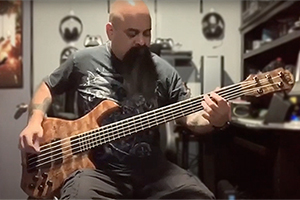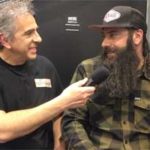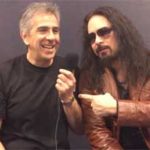Static-X bassist gives us the scoop on his band’s latest activities and offers up advice for new players
Exclusive interview with FBPO’s Jon Liebman
July 12, 2021
A heavy hitter on the metal and industrial scenes, Tony Campos has slugged out the bass riffs for tons of memorable bands. Over the course of his career, he’s played with Static-X, Fear Factory, Ministry, Prong, Soulfly, and Possessed, and even served as the bassist for the Mexican-American metal group Asesino under the stage name “Maldito X.” Right now, Campos is a member of Static-X’s most recent lineup. The group broke up in 2014, following the tragic passing of singer and guitarist Wayne Static. Campos, along with fellow original members Koichi Fukuda and Ken Jay, reformed the band in 2018. Last year, they released Project: Regeneration Vol. 1, the first new Static-X album in more than a decade.
FBPO: You almost need a scorecard to keep up with all the bands you’ve been in.
TC: [Laughs] Yeah. I have trouble keeping up with it sometimes.
FBPO: What’s keeping you busy these days?
TC: These days, touring-wise, nothing. I haven’t done a show in about a year, but then again, who has? I’ve just been working on stuff here at home, working on stuff for the next Static album; still got to finish that up. I’ve been just writing stuff, just whatever pops out of my head, and been writing and putting it down.
FBPO: You’re kind of a homebody, aren’t you?
TC: Yeah. When I’m not out on tour, I rarely leave the house except maybe to go to 7-Eleven or hit the drive through for some food. I do most of my shopping online. So this whole pandemic thing, it really didn’t change a whole lot for me, except I didn’t get to go out on tour. It was funny. I’ve been doing this now for what, 21, 22 years now? I remember, when I first started doing this, I’d get home from tour and then a couple of days (later) I was like, “All right, let’s go out, let’s go have fun.” Now you couldn’t even drag me out of the house. Maybe if Slayer got back together and did a show I’d get out of the house for that, but that’s about it.
FBPO: Does it look like you’re going to have a chance to promote Project Regeneration anytime soon? The fans have got to be pretty eager.
TC: We’re planning on doing a tour early next year, because we figure everyone and their mom is going to be out trying to book shows this year. We figure, we’ll let the big dogs fight it out and then once things calm down, we can do a proper tour.
FBPO: How much are you able to keep Wayne’s spirit alive in Static-X? I imagine it must be difficult.
TC: Well, not so much. With the material we have now, because it still has his fingerprint on it, we have his old tracks, we have some of his riffs. We have some of his programmings still. We definitely keep the spirit of what we had back in the beginning. What happens after that? I think this whole experience has put us all back in that head space that we were in, back in the early days when we were experimenting and we hit on the sound that we would dub “Evil Disco.” I mean, only time will tell, but I think we’re in that right head space to keep that vibe going.
FBPO: Tell me about your gear.
TC: Well, that’s kind of a loaded question too, because it changes from band to band.
FBPO: I was surprised to see you play a Zon bass. You don’t see too many heavy metal guys playing a Zon bass, for example. Why don’t we start there?
TC: Yeah. Well, funny enough that’s what they told me. That’s why they reached out to me because they wanted to get a couple more metal guys on their roster and at the time I was a Fernandes player for like, 10 years, and then the company decided to shut down their entire North America division. I kid you not, that month I got the news, I got hit up by Zon and I was like, “Really? You guys want to give me shit? Okay, cool!” Best thing that ever could happen to me, playing-wise, because these things are night and day, on a whole other level from anything else I’ve ever played. They practically play themselves, I always say. They’re that easy to play and they sound killer, man. The really cool thing is the necks. The necks will not move at all. I can take them out of the coldest subzero belly of an airplane and take them up onto a hot, sweaty stage and the neck will not move, it will not budge. It’s just like, “Whatever, dude. Let’s just jam.” Every tech I’ve had working on one is like, “Hey, I don’t have to do anything to this fucking thing.”
FBPO: What about amps?
TC: Amps, well, that depends on the gig. For Static, for Fear Factory, I don’t even have an amp on stage. I go direct to the front of house. The last time I played with Ministry and subsequent tours I’ve been on with Ministry, Al (Jourgensen)’s kind of old school and wants a backline so I have an Ampeg SVT-7 Pro and Ampeg 6X10 that I use for that. But, I’ve heard, the last tour he did, everybody went Kemper and straight to front of house. I don’t know, if I ever get that gig again, if he’s going to want me to do that. But for Static, or Fear Factory, I just go from my pedal board straight to front of house. Depending on the gig, I use different pedals.
FBPO: You’re a big Tech 21 fan, right?
TC: Yeah. I’ve been using them since ’99. They were one of my first endorsements, and I still use their stuff for my clean tone. I love the VT Bass and I still use that for pretty much everything. I am able to get that really bright, punchy tone without too boomy a bottom end, and it’s just punchy and clear. When I was a kid, the guys that I listened to, whose tone and I liked were Frank Bello, his tone on “Among the Living,” “Christian,” his tone on “Practice What You Preach.” I was like, “That’s the tone I want,” I’d been chasing since I was a kid, and so, I feel like I can get that with the Tech 21 stuff.
FBPO: How about strings? You’re a Dunlop guy, right?
TC: Yeah. I’ve been using them for 14, 15 years, probably. They’ve been great, man. They’ve been supportive from day one and their strings will last me the whole gig. I’m pretty notorious for breaking strings. I don’t know why, but ever since I started playing the Zons, I don’t break them as much. Maybe it’s because I’m older now and I don’t pick as hard or maybe it’s because the bass is better. I don’t know.
FBPO: Seems to me I’ve heard you talk about Hipshot. Is that still part of your setup?
TC: Yeah. I’ve been using their hardware exclusively for, probably, just as long as I’ve been with Dunlop. They have been really cool and I’ve always liked their gear. I started using the Detuner. Back in the Static days, the first two records were all recorded in C, and then for some reason, we decided to start doing everything in a drop B flat. While Wayne and Koichi were side stage retuning or swapping out guitars, I just hit a lever and I can sit back and have a beer.
FBPO: Let’s talk about your bass technique. Are you totally a pick player or do you break out your fingers once in a while too?
TC: I mean, it depends on the material because mostly I play metal, I’ll play with a pick. There’s two songs in the Static-X repertoire that I’ll play finger-style. It was “Black and White” and “Cold,” just because I wanted a rounder tone for those songs, so I’ll drop the pick and roll off the high end on my bass for those two songs. I’ll just sit in the pocket and groove with those songs. It’s all about a feel thing for me. If it feels like a type of song that I’ve got to sit in and lock in with the drummer and swing a groove, then I’ll more than likely play that finger style.
FBPO: What advice do you have for someone who wants to learn to play bass?
TC: Well, if you’re trying to get into playing rock bass, I would recommend starting out with AC/DC. It’s not too complex and I think Cliff Williams does an awesome job of, not only knowing where and when to play, but when not to play, to give a song the breathing room it needs to jump out and hit you when the chorus comes back in and the full band jumps in. If you want to learn rock bass, then AC/DC is probably the best place to start.
FBPO: It takes a certain discipline and even musical maturity to know when to play and when not to play.
TC: Yeah, absolutely because your role as a bass player is to support the song and when you can give the song dynamics like that, that makes the song so much better.
FBPO: What else lies ahead?
TC: The next thing is finishing up Volume Two and then we’re going to do this tour the beginning of next year. That’s the whole big way. We’re still in the planning stages. That’s what we’re hoping for. We’ll see if it happens or not.
FBPO: What would you be if you weren’t a bass player?
TC: It’s funny because this was the last thing I thought I’d ever do for a living. I went to college and I was a computer science major. I fully expected to be an IT guy working at the Department of Defense. Then things started happening for the band and I was like, “Oh, let’s see where this goes.” Twenty-one odd years later here, I am still doing this for a living.
See Jon’s blog, with key takeaways from this interview here.
Static-X’s Project Regeneration, Vol. 1, is available here:





